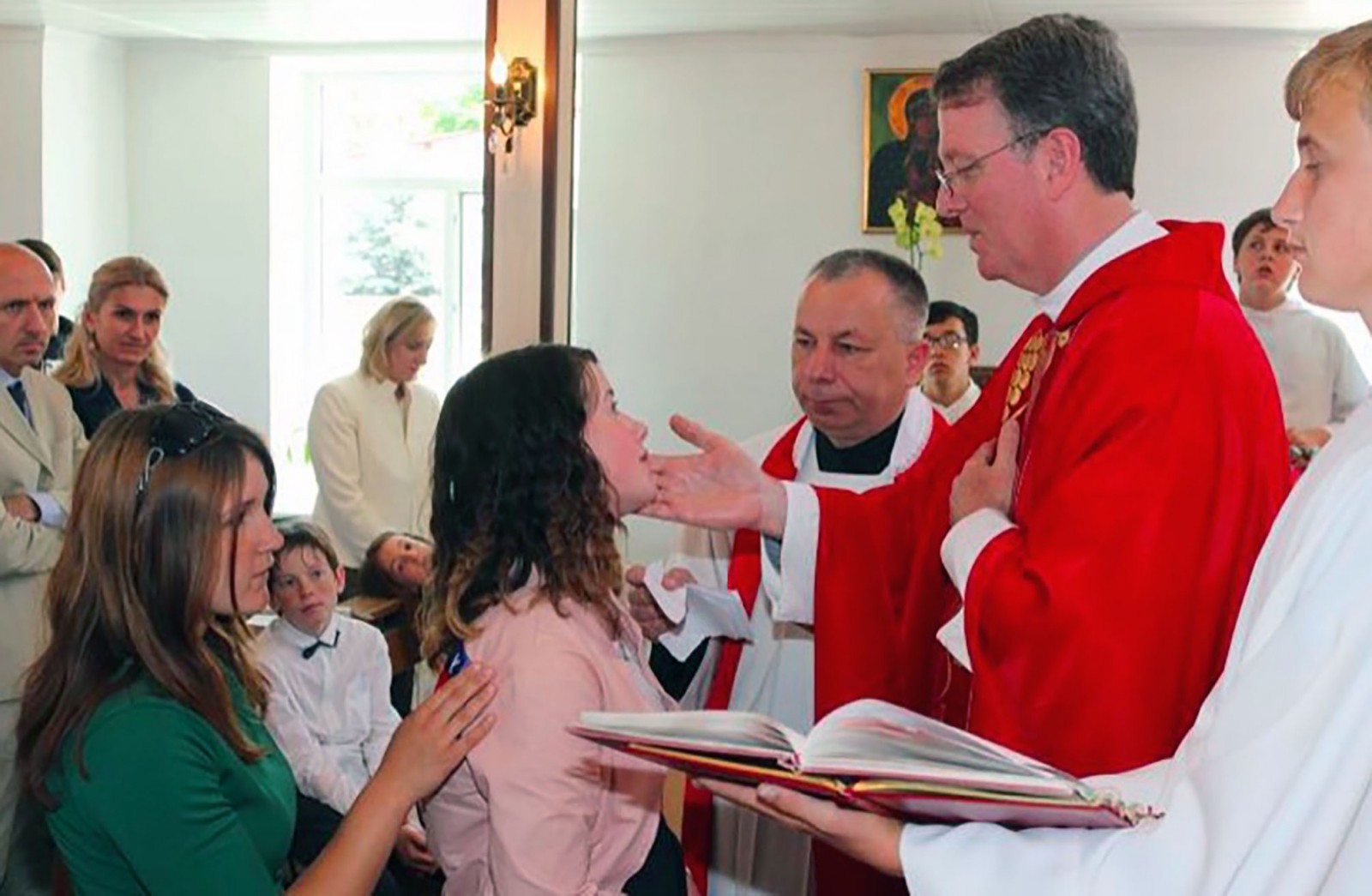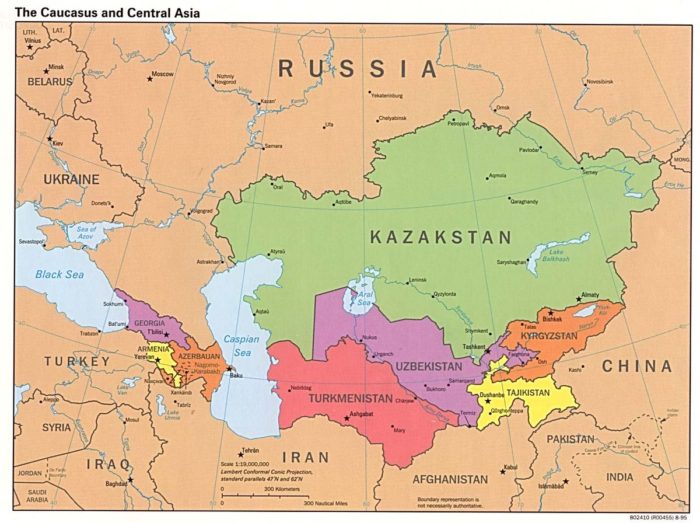ROME — Asked two years ago what still surprises him about the Church, Pope Francis replied, “The faith of the holy People of God. … There is a form of hidden holiness in the Church. There are heroes who set off on missions.”
Jesuit Father Anthony Corcoran, 55, is the apostolic administrator of Kyrgyzstan in Central Asia. His appointment in 2017 came after serving the Church for 21 years in Russia, mainly in Siberia. The Arizona-born, Texas-raised priest was the vicar general (1999-2008) in Novosibirsk and Jesuit major superior in Moscow (2009-2017). Last November, he was home for Thanksgiving — the first time in 20 years.
Christianity in Kyrgyzstan dates back to 14th- and 15th-century Franciscan missionaries and, before that, to Nestorian settlers along the Silk Road.
The first official Catholic parish was established in 1969. Pope St. John Paul II assigned the country to the Society of Jesus in the 1980s. Today, six priests and four nuns serve a community of between 600 and 1,500 Catholics nationwide.
As a former republic of the Soviet Union, the Russian language is spoken throughout Kyrgyzstan. Like Siberia, the Catholic community in Kyrgyzstan includes many descendants of communism’s victims. Unlike Russia, Kyrgyzstan is a majority-Muslim country.
Father Corcoran attended the clerical sex-abuse summit in Rome, where senior correspondent Victor Gaetan interviewed him. The following week, the priest participated in the ad limina visit with the Holy Father of the bishops of Central Asia. Just like the bishops, he, as apostolic administrator, is required by canon law to update the pope every five years on the status of their dioceses.
I flew from Bishkek to Moscow and from Moscow to Rome the next day. How can I complain? I was on airplanes, very comfortable. The families of many Catholics I serve came [to Kyrgyzstan] in cattle cars, arrested by Stalin, or forced to relocate during war.
And their children and grandchildren comprise the Catholic community today?
Yes. Most are German, Polish, Ukrainian or Lithuanian families, whose ancestors either migrated to Central Asia on their own before the [Bolshevik] revolution or came against their will. You know, religion has much to do with ethnic identity in the former Soviet Union.
In Kyrgyzstan, we have three main parishes and some smaller ones. The majority of the 6-million population is Sunni Muslim.
How did they preserve their faith when there was no religious freedom?
In the late 1990s, I met people who had not seen a [Catholic] priest in decades. It was very beautiful and edifying to meet the babushkas (grandmothers) who kept the faith. They baptized the children, taught them prayers. When possible, one would go to the Baltics to get blessed salts, which could be brought back to make holy water.
I’ve talked to other missionaries about this, and we found three common threads in Catholic practice when the sacraments were not widely available: making and reverencing the Sign of the Cross; keeping the narrative of Christ’s life and our salvation alive in their minds and hearts; and praying the Rosary — with their fingers, since most did not have rosary beads.
Two sisters whose parents were gone said, “We don’t know the prayers.” I asked them how they prayed, and they pulled out a rosary. Although they did not know the Hail Mary, they held on to the rosary as they prayed. Doesn’t that show how Mary holds on to us?
In the late 1990s and early 2000s, the No. 1 task of the Church was to locate, reorganize and recatechize these Catholics.
What are the Church’s priorities in Kyrgyzstan and Central Asia?
Central Asia is a significant area. It is a large territory that is very unique. It’s not the Middle East, not Southeast Asia. The Church has been there for a long time and must be active.
Of course, first, we offer pastoral service. We are constantly searching for ways to re-evangelize, catechize and serve by living and sharing the light of our faith in Jesus Christ.
Then can the Church grow? The Holy Spirit allows the Church to expand, to grow and deepen. It is the Holy Spirit who decides where that will be and how it will be. We prepare the ground.
In Kyrgyzstan, we concentrate on pre-evangelization work — the first steps of evangelization — in education and humanitarian efforts. For example, we have a Russian-speaking Polish Jesuit who gives talks at schools about science and religion, with a special focus on astronomy. We have four School Sisters of St. Francis from Slovakia. We run two camps for Catholic children at Lake Issyk-Kul [the world’s second-largest saline lake].
How are your relations with other religions and with the government?
Christians are such a minority, there is a lot of openness. Very often, our families are mixed. We have very good relations with the Russian Orthodox Church, which represents about 10% of the people. So there is a lot of goodwill and personal interaction. I saw the Orthodox bishop last week.
Another way Kyrgyzstan is a remarkable country: It has a real commitment to finding balance between freedom and security. We feel quite free to do our work. Please God that this continues, as it is not true everywhere.
The government itself has a commission for interreligious dialogue. I’m really encouraged and impressed because everyone in the world is struggling with this.
What impact did Pope Francis’ meeting with Russian Orthodox Patriarch Kirill have on Orthodox-Catholic relations?
It was a joyful moment for Catholics in Russia. It gave the Catholic Church a solidity because the patriarch himself was meeting with the Holy Father. For Catholics, it was a consoling moment. The atmosphere has been good since, despite some people in both Churches who weren’t happy with it.
Overall, it facilitated respect and opened up more communication. On Feb. 12, to mark the third anniversary of the meeting, the Russian patriarchate in Moscow sponsored a conference regarding end-of-life issues, including euthanasia, where the two Churches have common positions.
How is the Holy Father perceived in Kyrgyzstan?
Well, his recent trip to the [United Arab] Emirates was a big hit. I noticed the visit was featured extensively on the news shows. When we talk to people, we can assure them that the Pope is telling us through that action not all Muslims are evil.
In our part of the world, Muslims were encouraged that the Pope spoke, with such reverence, to Muslims.
What particular wisdom or advice has helped you in your ministry?
An old missionary, from China as I remember, an old Jesuit, told me, “Every day pray for two things. Pray that you fall in love, absolutely love, the people you are there to serve, and pray that you love the language.” I remember being surprised by both of those.
He explained, “You don’t have to love a government, you don’t have to love a culture, but if you don’t love people, concrete people, what are you doing there? Who do you think you are?” Love is the only thing that changes anything, and that’s what a missionary does.
God granted me this. I have a love for Russia’s people and language. I am not an idealist about any one nationality — there are different kinds of people everywhere — but the witness of Christians who kept their faith throughout the persecution of the Church for so many decades continues to be an inspiration to me; the Russian capacity for generosity does, too.
The Russian people “confirm” the ultimate victory of the working of grace in the human heart. And now I feel the desire to pray to love the people of Kyrgyzstan, who I am called to serve.
When did you become interested in Russia? Is there a relationship between your vocation and your calling to serve in this region?
When we were children, our grandmother told us that Mary wanted all to pray daily for Russia. I think that my fascination with Russia began then. I remember having a strong sense of compassion for the Russian people, even if there was a fear of the Soviet government.
When I entered the Society in 1985, I shared my desire to serve as a priest in the Soviet Union. Our novice master insisted, “God will open even the Soviet Union at some point, and the Church will search for priests. You will then need to be ready.” When this finally did happen, St. John Paul was pope, and we understood that he would ask the Society to help the Church in Russia. My superiors remembered my desire and asked me to discern with them about this possibility. My first assignment as a priest after ordination was to work in Novosibirsk, Siberia.
Register senior correspondent Victor Gaetan is an award-winning international
correspondent and a contributor to Foreign Affairs magazine and The American Spectator.

